

Options for Independence services for people with disabilities in Scotland. Community support services for people with disabilities Our community support services help adults with physical disabilities live in their own homes and play an active part in their local communities.
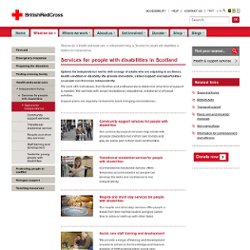
Transitional residential service for people with disabilities Our transitional residential service offers temporary accommodation so people can develop the skills and confidence to live independently. Power – and the Scottish Mental Health Arts and Film Festival - WestEndReport.com - WestEndReport.com. This year’s Scottish Mental Health Arts and Film Festival (SMHAFF) was launched today with power the theme at the heart of more than 300 events staged throughout Scotland.
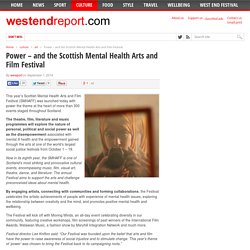
The theatre, film, literature and music programmes will explore the nature of personal, political and social power as well as the disempowerment associated with mental ill health and the empowerment gained through the arts at one of the world’s largest social justice festivals from October 1 – 19. Now in its eighth year, the SMHAFF is one of Scotland’s most striking and provocative cultural events, encompassing music, film, visual art, theatre, dance, and literature. The annual Festival aims to support the arts and challenge preconceived ideas about mental health. Festival director Lee Knifton said: “Our Festival was founded upon the belief that arts and film have the power to raise awareness of social injustice and to stimulate change. 00398762.pdf. A Working Life for All Disabled People: The Supported Employment Framework for Scotland: Main Report. CHttpHandler.ashx. 0016699.pdf. 0077375.pdf. Education in Scotland. Traditionally, the Scottish system at secondary school level has emphasised breadth across a range of subjects, while the English, Welsh and Northern Irish systems have emphasised greater depth of education over a smaller range of subjects.
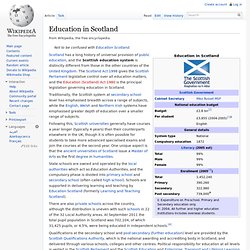
State schools are owned and operated by the local authorities which act as Education Authorities, and the compulsory phase is divided into primary school and secondary school (often called high school). Schools are supported in delivering learning and teaching by Education Scotland (formerly Learning and Teaching Scotland). There are also private schools across the country, although the distribution is uneven with such schools in 22 of the 32 Local Authority areas. At September 2011 the total pupil population in Scotland was 702,104, of which 31,425 pupils, or 4.5%, were being educated in independent schools.[4] School years[edit] Children start primary school aged between 4½ and 5½ depending on when the child's birthday falls. Curriculum[edit] Scottish Qualifications Authority. The Scottish Qualifications Authority (SQA) (Gaelic: Ùghdarras Theisteanas na h-Alba)[1] is the executive non-departmental public body of the Scottish Government responsible for accrediting educational awards.
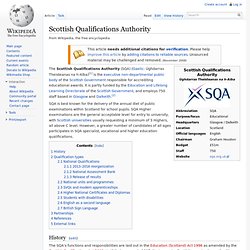
It is partly funded by the Education and Lifelong Learning Directorate of the Scottish Government, and employs 750 staff based in Glasgow and Dalkeith.[2] SQA is best known for the delivery of the annual diet of public examinations within Scotland for school pupils. SQA Higher examinations are the general acceptable level for entry to university, with Scottish universities usually requesting a minimum of 3 Highers, all above C level.
Inclusion Scotland. Www.scotland.gov.uk/Resource/Doc/924/0077375.pdf. Healthy Working Lives. You may be trying to access this site from a secured browser on the server.
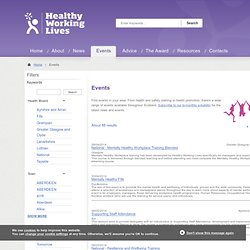
Www.employabilityinscotland.com/media/109900/education_and_practice_development_support_for_vocational_rehabilitation_-_a_collaborative_project.pdf. Co-ordinated, integrated and fit for purpose: A Delivery Framework for Adult Rehabilitation in Scotland. 3.
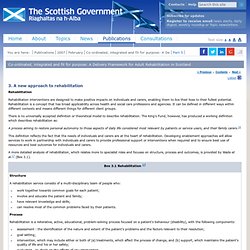
A new approach to rehabilitation Rehabilitation Rehabilitation interventions are designed to make positive impacts on individuals and carers, enabling them to live their lives to their fullest potential. Rehabilitation is a concept that has broad applicability across health and social care professions and agencies. It can be defined in different ways within different contexts and means different things for different client groups.
There is no universally accepted definition or theoretical model to describe rehabilitation. A process aiming to restore personal autonomy to those aspects of daily life considered most relevant by patients or service users, and their family carers.16 This definition reflects the fact that the needs of individuals and carers are at the heart of rehabilitation. Library.nhsggc.org.uk/mediaAssets/Leaflets/nhsggc_leaflet_condition_management_programme_leaflet.pdf.
Anerkennung. Young Scot Corporate. Supporting Curriculum for Excellence (CfE), quality and improvement, assessment, community and lifelong learning - Education Scotland. Education Scotland. Education Scotland (Scottish Gaelic: Foghlam Alba, Scots: Eddication Scotland) is an Executive Agency of the Scottish Government, tasked with improving the quality of the country's education system.
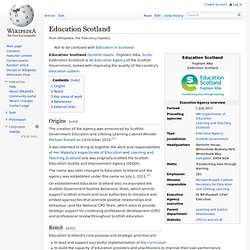
Origins[edit] Education in Scotland. Youth Scotland - About Us. We are the largest non-uniformed youth organisation in Scotland and deliver quality youth work programmes, information, resources, training and support to community-based youth work.

The organisation has been in existence since the early years of the 20th century and has a membership of 1,209 groups, with 60,841 young people and 7,396 youth workers. In addition, we have supported 3,063 young people to gain recognition for their achievements via 63 operating agencies (including local authorities, voluntary agencies, colleges and schools) and 442 participating units (including youth groups, volunteer centres, youth councils and schools). The Youth Scotland membership is diverse, ranging from small rural youth groups to large urban projects.
The common goal that we all share is better outcomes for young people.